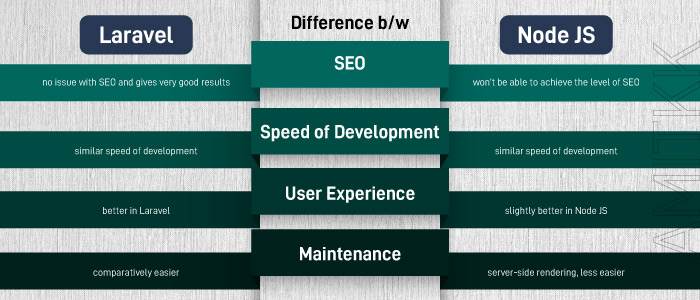Laravel vs Node JS - Both Laravel and Node JS are mature frameworks and have their usage. They are remarkable frameworks that have built their followings with many websites built on them. Comparing them will be like comparing apples to oranges. In this article, we shall cover the pros and cons of each framework and how and where you can use them. Laravel and Node JS have huge libraries behind them and provide tons of built-in functionalities. These functionalities make website development fast, exciting, robust, and highly scalable.
Laravel vs Node JS: Laravel and Node JS can act as a backend to the JavaScript frontend frameworks like React JS, Vue JS, Angular JS, and more. It makes them a good choice for the admin panel for mobile applications allowing you to create APIs and present data in tabular and charts.
Laravel
It is the leading framework for PHP and has boosted the language by a great deal. It has a very robust authentication system where you can create all kinds of users. Using a library like Spatie or your middleware, you can create wonders in restricting access and managing roles.
Libraries like Tailwind and Alpine JS can be used easily in Laravel, making development fun and the front end aesthetically beautiful. Using Livewire, you can achieve the same level of user experience as in other JavaScript frameworks.
The beauty of the JavaScript frameworks propelled Laravel 8 to adapt itself to the changing web environment.
Node JS
Before Node JS came into the picture, frontend frameworks mostly used PHP or its framework as an admin panel. The mix of JavaScript as frontend and PHP as backend did work, but a JavaScript framework that can be used as backend would have been preferred to maintain uniformity.
You can create your middleware and use external libraries to create authentication tokens. Connecting and accessing the database is simple and easy here, and you can work just like in any framework.
Node JS can use with all the JS frontend frameworks with much ease. Since the whole website is built on JavaScript, the performance is good.
Difference between Laravel and Node JS
Even though both frameworks are good, there are slight differences between the two which we will explore from both user and developer perspectives.

SEO
Node JS is a JavaScript framework that adds an extra step when crawlers scan for indexing. If you use JavaScript-based frontend frameworks with this, SEO gets hampered big time. It would help if you used frameworks like Next JS, which supposedly have been designed keeping SEO in mind.
With any JS framework, you won’t be able to achieve the level of SEO that a PHP framework provides. Achieving the same level of SEO results in JS frameworks can be difficult and takes all the benefits away from it.
Laravel, on the other hand, has absolutely no issue with SEO and gives very good results.
One of the major reasons for website development agencies like us is to shift back from JS to Laravel websites.
Speed of Development
Both frameworks have a relatively similar speed of development. In Laravel, the complete authentication system comes pre-built, while you have to develop them in Node JS.
All other pages require a similar time for development, with reusable components available in both.
User Experience
User experience is slightly better in Node JS as JavaScript is somewhat faster than PHP. Laravel 8, which uses AJAX to make real-time backend queries, makes up for much of the gap.
The speed at which the rendering of pages takes place is very good in Node JS, and using it with frontend frameworks makes it more exciting.
Maintenance
Maintaining a Laravel framework is comparatively easier than Node JS as only the specific files have to be replaced, and everything works smoothly. All you have to do is maintain the coy of the codebase in your local system and replace it on the live server.
In Node JS, and specifically if you are using server-side rendering, the whole codebase needs to be pre-built, replaced on the live server, and the server needs to be restarted for changes to be implemented. It can be hectic if you have to change regularly.
Which one would I recommend?
We are fluent in Laravel and Node JS and usually leave the decision to the client himself. We are slightly biased towards Laravel, mostly because of its SEO benefits. As a digital marketing agency, SEO is our top priority; everything comes second.
Laravel has almost the same advantages as Node JS, and choosing it over Node JS is always the best option.
Laravel vs. Node JS. Which one to choose for a project?
When deciding on which technology stack to use for a project, two popular choices are Laravel and Node.js. While both technologies have different strengths and weaknesses, there are some essential factors to consider when deciding which one to use.
In Terms Of Scalability
- Laravel: Laravel might take longer to set up than Node.js, but it is very scalable.
- Node JS: It can manage several requests simultaneously due to its excellent scalability. Due to its scalability and ability to process massive volumes of data, it is ideal for such applications.
In Terms Of The Support Of The Community
- Laravel: Unlike Node.js, Laravel has a smaller developer community, but keep in mind that only with the comparison to Node.js.
- Node JS: The open-source community supports Node.js and has a sizable and vibrant development community. This means that developers have a wealth of information about the technology and its best practices.
In Terms Of Security
- Laravel: Strong security protections are included in Laravel, which is usually regarded as secure for most projects.
- Node JS: Because of the open-source community's strong support for Node.js, security flaws are more likely to be found and fixed promptly. In general, Node.js is considered more secure than Laravel due to its asynchronous programming model and ability to process multiple requests at a time simultaneously.
In Terms Of Programming Language
- Laravel: PHP is a popular and well-supported programming language used by Laravel.
- Node JS: JavaScript is a widely used and recognized programming language utilized by Node.js. In addition to being very simple to learn, JavaScript enjoys strong backing from the open-source community.
In Terms Of Data Storage
- Laravel: Projects that use relational databases, like MySQL or PostgreSQL, are ideally suited for Laravel.
- Node JS: Applications that quickly handle a lot of data are ideally suited for Node.js. It is also a good fit for applications that need to store data in a NoSQL database and have quick responses.
In Terms Of Hosting
- Laravel: Laravel can also be hosted on various cloud hosting providers, but the hosting costs can be higher than the cost of hosting Node.js.
- Node JS: Node.js can be hosted on various cloud hosting providers, including Amazon Web Services, Microsoft Azure, and Google Cloud Platform.
In Terms Of Cost/ Affordability
- Laravel: Laravel is often more expensive to develop than Node.js due to its complexity.
- Node JS: Node.js is generally less expensive to host than Laravel due to the lower hosting costs and the fact that it is open source.
Before making a final choice, it is crucial to consider the project's budget, security, and data storage considerations. In addition, the following factors are essential to consider while deciding on a technology stack for a project.
Laravel could be a better option if the project needs a relational database, while Node.js might be the best option if it needs to respond rapidly and scale quickly. Overall, Node.js is a better option than Laravel. The project's needs are the ultimate deciding factor.
How does AMITKK help in Website Development?
We have the best team of developers for both Laravel and Node JS and can build almost all kinds of projects in both. Our team of developers delivers the project on time and within cost. You can get a single vendor or multi-vendor e-commerce in Laravel and Node JS.
The cost and time of website development are kept the same for both frameworks. The level of quality is always kept high by our testing team. Feel free to connect with us for your project.



















 Digital Marketing Company In Delhi
Digital Marketing Company In Delhi  Website Designing Company In Delhi
Website Designing Company In Delhi  Ecommerce Website Development In Delhi
Ecommerce Website Development In Delhi  Website Development In Gurgaon
Website Development In Gurgaon  Website Development In India
Website Development In India  Wordpress Development In India
Wordpress Development In India  Website Development In Bangalore
Website Development In Bangalore  Website Development in Ahmedabad
Website Development in Ahmedabad  Website Development in Kolkata
Website Development in Kolkata 




